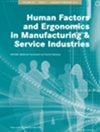信任中介人群交互监督控制中的信-信关系
IF 2.2
3区 工程技术
Q3 ENGINEERING, MANUFACTURING
Human Factors and Ergonomics in Manufacturing & Service Industries
Pub Date : 2020-12-01
DOI:10.1177/0018720819879273
引用次数: 26
摘要
目的本研究旨在进一步验证信任在自动化可靠性和人类对自动化的依赖率之间的相互依赖关系中的中介理论。人类对自动化的信任一直是许多研究的焦点。从理论上讲,信任已经被提出通过中介自动化可靠性和人类依赖率之间的关系来影响人类对自动化的依赖。然而,实验结果是相互矛盾的,一些人证实了信任的中介作用,而另一些人则否认了这一点。因此,重要的是通过实验重新研究信任的作用,并了解如何根据现有理论解释结果。方法32名被试监督一群无人机进行采集任务,无人机根据采集到的信息对是否采集潜在目标提出建议。通过操纵推荐信度,我们观察到参与者的信任和行为反应的变化。结果通过主体内中介分析,发现信任在群体可靠性与信赖率的关系中起显著的中介作用。高群可靠性提高了正确接受率,但降低了正确拒绝率。信度对反应时间无显著影响。信任不仅仅是互动的副产品;它具有预测能力,可以估计对自动化的依赖程度。信任的中介作用证实了信任校准在确定适当的群体自动化依赖水平方面的重要性。本文章由计算机程序翻译,如有差异,请以英文原文为准。
Trust Mediating Reliability–Reliance Relationship in Supervisory Control of Human–Swarm Interactions
Objective This work aims to further test the theory that trust mediates the interdependency between automation reliability and the rate of human reliance on automation. Background Human trust in automation has been the focus of many research studies. Theoretically, trust has been proposed to impact human reliance on automation by mediating the relationship between automation reliability and the rate of human reliance. Experimentally, however, the results are contradicting as some confirm the mediating role of trust, whereas others deny it. Hence, it is important to experimentally reinvestigate this role of trust and understand how the results should be interpreted in the light of existing theory. Method Thirty-two subjects supervised a swarm of unmanned aerial vehicles (UAVs) in foraging missions in which the swarm provided recommendations on whether or not to collect potential targets, based on the information sensed by the UAVs. By manipulating the reliability of the recommendations, we observed changes in participants’ trust and their behavioral responses. Results A within-subject mediation analysis revealed a significant mediation role of trust in the relationship between swarm reliability and reliance rate. High swarm reliability increased the rate of correct acceptances, but decreased the rate of correct rejections. No significant effect of reliability was found on response time. Conclusion Trust is not a mere by-product of the interaction; it possesses a predictive power to estimate the level of reliance on automation. Application The mediation role of trust confirms the significance of trust calibration in determining the appropriate level of reliance on swarm automation.
求助全文
通过发布文献求助,成功后即可免费获取论文全文。
去求助
来源期刊
CiteScore
5.20
自引率
8.30%
发文量
37
审稿时长
6.0 months
期刊介绍:
The purpose of Human Factors and Ergonomics in Manufacturing & Service Industries is to facilitate discovery, integration, and application of scientific knowledge about human aspects of manufacturing, and to provide a forum for worldwide dissemination of such knowledge for its application and benefit to manufacturing industries. The journal covers a broad spectrum of ergonomics and human factors issues with a focus on the design, operation and management of contemporary manufacturing systems, both in the shop floor and office environments, in the quest for manufacturing agility, i.e. enhancement and integration of human skills with hardware performance for improved market competitiveness, management of change, product and process quality, and human-system reliability. The inter- and cross-disciplinary nature of the journal allows for a wide scope of issues relevant to manufacturing system design and engineering, human resource management, social, organizational, safety, and health issues. Examples of specific subject areas of interest include: implementation of advanced manufacturing technology, human aspects of computer-aided design and engineering, work design, compensation and appraisal, selection training and education, labor-management relations, agile manufacturing and virtual companies, human factors in total quality management, prevention of work-related musculoskeletal disorders, ergonomics of workplace, equipment and tool design, ergonomics programs, guides and standards for industry, automation safety and robot systems, human skills development and knowledge enhancing technologies, reliability, and safety and worker health issues.

 求助内容:
求助内容: 应助结果提醒方式:
应助结果提醒方式:


